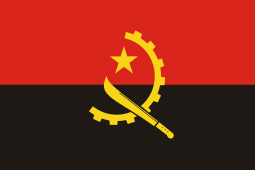João Bernardo de Miranda
João Bernardo de Miranda (born July 18, 1952) is an Angolan politician who is currently the Governor of Bengo province. He was Minister of External Relations of Angola from January 1999 to October 2008.[1]
Early life
De Miranda was born in Caxito-Dande |Bengo, Angola. De Miranda has academic degrees in journalism, law, and international relations.
Early career
He began his political career at a very young age by joining the Popular Movement for the Liberation of Angola (MPLA), Angola's ruling party since its independence in 1975. He has held various positions within the party mostly related to journalism, radio, and propaganda.
In 1990 he was appointed to the post of Vice-Minister for Information, and was chosen to be part of the task force in the Bicesse Accords the following year. He was moved to the Ministry of External Relations soon after. In 1993 he led a high level governmental task force to the exploratory conversations with the National Union for the Total Independence of Angola (UNITA) that took place in Zambia. The outcome of those talks gave way to the signature of the Lusaka Protocol in 1994.
Foreign minister
He was appointed Minister of External Relations in 1999 during a very critical time, in which the National Assembly of Angola gave President Jose Eduardo dos Santos a substantial amount of power in order to bring about an end to the civil war the nation was facing. In the process, President dos Santos made a series of critical changes within the government that brought a core of loyal and pragmatic individuals such as Fernando da Piedade Dias dos Santos, Kundi Paihama, and de Miranda. Being fully oriented by President dos Santos, the newly appointed minister began an intensive and tireless diplomatic campaign in order to isolate UNITA politically, and weaken its military capabilities through sanctions on its arms suppliers. In the process he was able to gain international sympathy for the Angolan government's cause.
De Miranda is greatly praised by top western diplomats and officials and gathers an array of diplomatic influence around many African nations.
In 2002, de Miranda secured more than enough votes for Angola in the UN Security Council, as a non permanent member for the 2002 - 2003 period.
In 2003, de Miranda was featured in the book cover of Leaders of the World - 2003 by the late American author Marilyn Perry. In his book "15 Meses no Ministério dos Negócios Estrangeiros" former Portuguese Minister of Foreign Affairs Diogo Freitas do Amaral described de Miranda as a solid politician with whom he was very pleased to work.
In 2006 de Miranda oversaw, under the watch of President dos Santos, the successful elections in the Democratic Republic of Congo, as part of the stabilizing process in the Great Lakes region.
Miranda was the 32nd candidate on the MPLA's national list in the September 2008 parliamentary election.[2][3] He won a seat in this election, in which the MPLA won an overwhelming majority in the National Assembly.[3] Following the election, President dos Santos appointed Assunção dos Anjos to replace Miranda as Foreign Minister on October 1, 2008.[4]
Miranda was subsequently the African Union's envoy to Guinea-Bissau at the time of that country's June 2009 presidential election. Following the assassination of presidential candidate Baciro Dabo, he said on state radio that the African Union wanted the election to go ahead as scheduled.[5]
De Miranda is also the author of two literary works.
References
- ↑ "Governador". Governo Provincial do Bengo. Retrieved April 12, 2014.
- ↑ "Eleições: Lista integral dos candidatos do MPLA, antigo PM Marcolino Moco fora, nova cara Akwá", Angola Xyami, July 5, 2008 (Portuguese).
- 1 2 List of deputies elected in the 2008 election, CNE website (Portuguese).
- ↑ "Presidente da República nomeia novos membros do Governo", Angola Press, October 1, 2008 (Portuguese).
- ↑ "GBissau polls 'should go ahead' despite killing", AFP, 8 June 2009.
External links
- Peter James Spielmann, Angola accuses world of ignoring its civil war, Associated Press, October 1, 1999
- United Nations Security Council Report On the Situation of Angola
